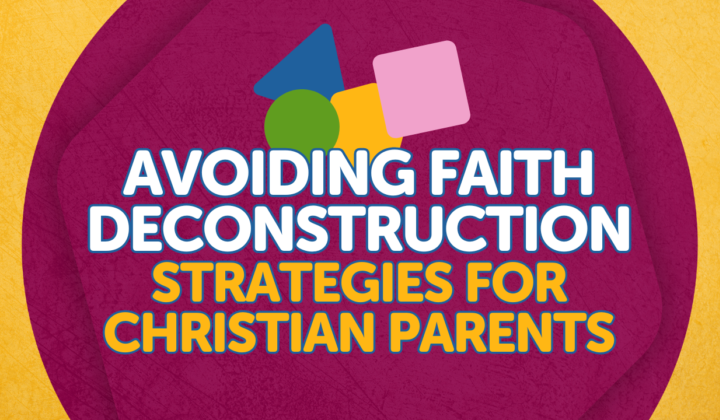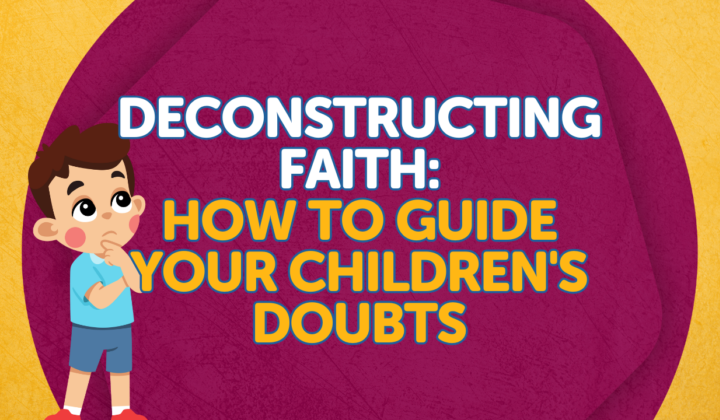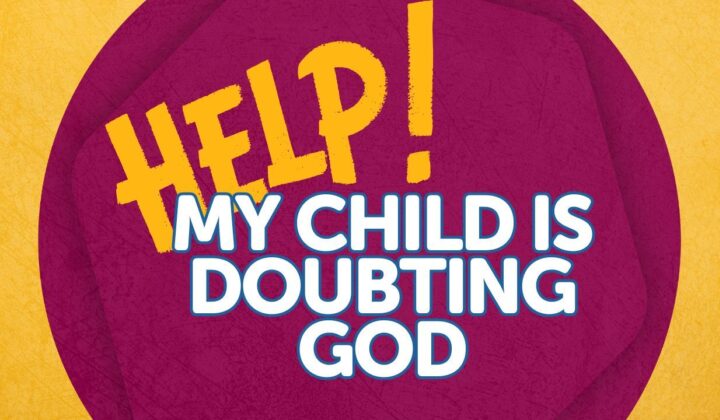Learn more about the journey that led to us equipping kids to carefully evaluate every idea they encounter.
Meet members of our team who have contributed to curriculum development.
Hear from real users of the Foundation Curriculum.
Learn what we believe about God, Jesus, Scripture, and more.
How to Navigate Family Relationships When Loved Ones Deconstruct Their Faith
Today's podcast question says: "My siblings have deconstructed their faith and moved towards a progressive Christian belief, denying the authority of the Bible, et cetera. What wisdom/resources can you recommend on how to navigate the time spent with these relationships so our kids are not influenced and sown doubt because of them?"
This is an important question for us to think through. And the first thing I want to say to the person who wrote this question is: I'm so sorry. I know it can be incredibly painful when those we love dearly choose to walk away from the historic Christian worldview and believe things we know are not true. So I'm so sorry that you are walking through this, and I know that you are not alone. Many of our listeners are walking through very similar situations—whether it's with siblings, other family members, close friends, or loved ones.
So today we're going to look at how we can wisely walk through relationships with those we love who have deconstructed their faith or moved towards another worldview, and how we help our children understand how to navigate these relationships.
Viewing This as an Opportunity, Not a Threat
Now, I know that for the questioner and for others who are walking through situations like this, this can be a really fearful thing. You're thinking, "Oh my goodness, is this person going to influence my child?" However, I think that it is so important for our children to have relationships with people who are not believers, because the majority of people in our world are not following Christ, are not Christians.
Helping our children understand that we have been called by God to be in this world but not to live according to this world—not to be of this world—and that we have been called to love others without affirming their sin is so important. So while it is good to grieve the fact that these people you love (in this case, your siblings) are not walking with Jesus, and that's a good and healthy thing to grieve, I don't think it's something we need to fear. I think that rather than viewing this as a threat, we need to view this as a wonderful opportunity for discipling our children.
Be Honest with Your Kids
The first thing I recommend is being honest with your kids about where your siblings are, especially if this sibling has recently deconstructed and things are different. Explain that this aunt or uncle who recently was professing Jesus is now believing something different. Just explain to your kids that they are believing things that do not align with Scripture. In this case, they're believing that the Bible isn't God's word.
Then I recommend explaining to your children that as a family, it's your job to love this person—to love this relative or these relatives.
Teach What Love Looks Like
Then talk through what that means. For those of you who haven't yet taken the children in your care through our God's Good Design curriculum here at Foundation Worldview, if your children are ages nine or younger, I highly recommend that you take them through that curriculum because we explain all different forms of ways in which sin has corrupted God's good design. But we also have specific lessons where we actually look at what it looks like to love someone who is not living according to God's design.
So in this situation, I recommend that you talk with your kids about what it looks like to love this family member or these family members. Talk about how you're going to continue getting together with them. You're going to care for them. You're going to ask them questions about themselves. You're going to share parts of your life with them.
Then talk about how at times it may mean that you are going to speak the truth in love to them. However, let your children know that it's not their job—it's not your child's job as a child—to confront adults in their sin.
Keep Communication Open
Now, once you've talked through this with your child, let them know that you are always open to any questions that they may have. They may have questions about what their aunt or uncle believes. They may have questions about something their aunt or uncle has said to them, or something they saw them do, or any concerns that they may have. Just let them know that you are always open to any questions that they have. So ask them if they have any questions at that point.
And then after any family gatherings, you can debrief with your kids. Ask them how it went, what they enjoyed about the family gathering, good times that they had with other people. And then if there's anything that these family members said to them, or any things that they observed these family members doing that confuse them or made them uncomfortable, just debrief with them. Walk them through how to biblically evaluate what they encountered.
Model Healthy Relationships
And then I think it's really important to model for your children what a healthy relationship looks like with these extended family members who are not following Jesus. Pray for them. Pray for wisdom that God would give you wisdom in your interactions with them. Pray that God would help you to love them.
When you're at family gatherings, model what it looks like to walk up to your brother or sister or whoever else it is, to give them a hug, to ask them questions about how their job is going or how different things in their family are—just to show them that you love them, that somebody doesn't need to be living exactly according to the biblical worldview for us to love them or care about them.
Think about God. God sent His Son Jesus while we were still sinners. He didn't wait for us to clean up our lives on our own because we couldn't have done that. But He knew that we needed Jesus, that we needed the righteousness of Christ, and He came and pursued us. And we can model this in our relationships with those who are not living according to the biblical worldview—that we can pursue them, that we can love them, that we can care for them.
Examine Your Own Heart
I think it's also important that in these situations we model praying that God would convict us if we have sinned against them in any way, because we want to make sure that we have a clean and open relationship with them.
I am in an incredibly blessed position in that both of my parents are Christians. They love Jesus. They're living their whole lives for Him. And I have the incredible blessing that both of my siblings are walking with God, and they have married—my brother married a woman and my sister married a man—who both love God and are seeking to raise their kids in the fear and admonition of the Lord. And I know that that's a very, very rare situation.
But even in that situation, there were ways that the Lord convicted me that I had sinned against my siblings when we were growing up, that I had never asked for forgiveness for. So I know that in my mid-twenties, I had to go to my siblings and say, "Hey, these are things I did when we were growing up, and it was a sin against God. It was a sin against you. Will you forgive me for that?" And I know in the moment it was kind of awkward, but my relationship with my siblings was never the same after that—we just always grew closer after that.
So make sure even in your own relationship that you're just asking the Lord to convict you. If there are things you need to ask your family members for forgiveness for—ways that you have sinned against them in the past—clear up that relationship.
An Opportunity to Live Out the Gospel
As I mentioned before, I think it's really important that in any situation, we do not view these relationships as a threat but as an opportunity to love our family and friends and to model for our children what the gospel and the Christian worldview look like in action. This is an amazing opportunity to model for our kids what it looks like to love others, to live out the gospel before them.
Prayerfully Consider Boundaries
Now, every situation is different. So even for the person who specifically wrote in this question, I don't know the ins and outs of your family situation. I don't know where your siblings are. I don't know what kind of lifestyles they're living. I don't know what your relationships with them look like. And for everybody else who's listening who's in similar situations, I don't know the ins and outs of your situation. So I am very limited in the amount of direct advice that I can give you.
So I would recommend that you just prayerfully discern when new boundaries are needed in these relationships. And I also recommend that you bring in other mature brothers and sisters in Christ who can pray about this with you, who can offer you counsel in ways that I can't because I don't know the specifics of your situation. So just prayerfully consider: Lord, do we need new boundaries? Here is what we have established. Whether you see these family members once a week or once a month or just at holidays, do we need new boundaries?
I think in many situations, new boundaries are not necessary unless children are in physical danger or unless this family member is being aggressively hostile towards the biblical worldview and being very vocal about it with our children. But again, I don't know the ins and outs of your situation. So prayerfully consider when new boundaries might be needed, and also invite those in your sphere of influence—brothers and sisters in the Lord who know you and know your kids well, and who can be praying about this and who can offer specific advice for your specific situation.
Recommended Resources
Finally, the questioner asked about resources. I highly recommend that if you have not checked out our Biblical Worldview, our Comparative Worldview, and our Careful Thinking curriculums, that you do so.
The Biblical Worldview is for children roughly ages four through seven, Comparative Worldview for children roughly ages eight through eleven, and Careful Thinking for children roughly ages twelve to fourteen. These curriculums are systematically designed to train your children to think critically and biblically, and they're going to set the stage for discerning every idea that comes their way—whether it's true or not true, whether it aligns with the biblical worldview or contradicts it. And so I highly recommend that if you have not taken the children in your care through the curriculum that's appropriate for their age, that you check that out.
Because really, what we're doing here at Foundation Worldview, I always like to compare us to nutritionists. Nobody's running to the nutritionist. People don't usually run to the doctor until there's a bad diagnosis, when a lot of times there would never have been a bad diagnosis if people had run to a nutritionist ten years beforehand.
So we're not waiting. We're not saying, "Okay, once your child has questions about the faith, or once they're starting to deconstruct or doubt or wonder about these things, then talk to them about these things." We're saying, "Hey, these things haven't even risen to the surface yet. Your kids haven't expressed many questions or doubts. They're not deconstructing their faith, but they're in a stage where those things that are going to lead to deconstruction and unhealthy doubt are already being planted in their hearts and minds. And so in these early stages, before those seeds have begun to germinate, let's equip our kids with biblical truth, with the ability to carefully and critically and biblically evaluate every idea that comes their way, so that these seeds of deconstruction and unhealthy doubt don't even have an opportunity to take root." Because most of the time, those things take root years before they reach the surface.
So don't wait for your kids to start doubting. Don't wait for them to start deconstructing their faith. Start training them now in the early formative years where you can equip them to think critically and biblically through every idea and every situation that they encounter.
Take Action Today
Well, that's a wrap for this episode. If you found this helpful and want to equip your children with the tools they need to navigate our complex world, visit FoundationWorldview.com to explore our age-appropriate curriculums. Don't wait until doubt takes root—start building a strong biblical foundation today. And be sure to join our email list so you never miss future episodes and resources designed to help you raise children who can confidently evaluate every idea through the lens of Scripture.
But if you have a question that you would like for me to answer on a future Foundation Worldview podcast, you can submit that question by going to FoundationWorldview.com/podcast.
As we leave our time together, my prayer for you is that no matter the situation in which you and the children God has placed in your care find yourselves, that you would trust that God is working all things together for your good by using all things to conform you more into the image of His Son.
Related Posts and insights

Avoiding Faith Deconstruction: Strategies for Christian Parents
In this episode, we address a pressing concern for many Christian parents: how to raise children who won't deconstruct and leave their faith. With the recent trend of deconstruction, it's crucial to focus on raising faithful disciples of Jesus. We'll explore strategies to instill lasting faith in your children, helping them walk in truth and hold fast to Christ.

Deconstructing Faith: How to Guide Your Children's Doubts
Today's question says, "We raise our daughters seven and eight years old in the reformed tradition as children of the Covenant. However, this deconstruction fad worries me, even though they're not on social media. How do I foster an environment in which they feel free to express their doubts instead of looking for answers elsewhere?"

When Kids Start Doubting Faith: How to Respond
When kids start doubting faith, how should parents respond? Learn how to affirm questions, address doubts, and guide children toward biblical truth with wisdom and grace.



